
by bsquared5@aol.com | Mar 3, 2017 | Thoughts
Since the only consistent thing in life is change, it should be no surprise that once we adjusted to sending our child off to college, she glanced at the horizon and discovered she hadn’t ventured quite far enough from home yet. One in ten undergraduates study abroad on trips that last anywhere from a couple of weeks to an entire academic year, and they don’t have to be foreign language or art history majors to garner benefits.
I’ve seen the statistics. Students who’ve studied abroad are twice as likely to land a job within a year of graduation. They have 25% higher starting salaries and a sophisticated (and marketable) global approach to the world. If they can hone or pick up a foreign language while they’re away, this increases job prospects further and makes them international citizens, able to transition more easily between cultures in our shrinking world.
A semester in Italy sounded glamorous and exotic. She packed and repacked, trying to meet the luggage requirements (how can you fit three months’ worth of clothes, snacks and toiletries in one 50 pound bag?), and finally we waved goodbye at the airport. If you haven’t yet had a child travel far and away, here’s a glimpse into what it’s like.
- At least once before they leave, you will suggest an evening in for a movie night. This is a good time to watch Taken, and to rewind and
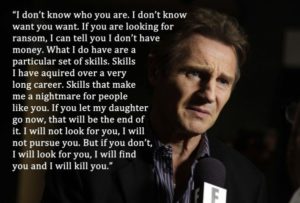 give in-depth and animated analysis of the part where the naive American girls give out personal information to a perfect stranger at the airport. Point out that while you don’t personally know Liam Neeson, you do have his speech memorized and are completely willing to make good on his threat. While it probably won’t, things can happen (Paris, Brussels, Nice), so make sure everyone has emergency numbers, passport copies in multiple locations, and international medical coverage.
give in-depth and animated analysis of the part where the naive American girls give out personal information to a perfect stranger at the airport. Point out that while you don’t personally know Liam Neeson, you do have his speech memorized and are completely willing to make good on his threat. While it probably won’t, things can happen (Paris, Brussels, Nice), so make sure everyone has emergency numbers, passport copies in multiple locations, and international medical coverage.
2. Staying in one place while abroad is not enough for millennials with tiny attention spans. Hopping a train or cheap flight to a neighboring country is common, usually fairly cost-effective, and an easy way to make the most of an extended study abroad trip. Traveling in small groups works well and offers more security. With any more than six opinions and preferences, more time is spent trying to herd cats than actually see a new city. Whoever came up with the name “hostel” for cheap student lodging is just spiteful. Why pick something that to English ears sounds patently unfriendly and scary? Might I suggest changing it to cubby?
3. You will be amazed at the child who consistently couldn’t manage to make curfew. Suddenly he transforms into a person able to juggle international train schedules, Google maps, and changing time zones to be certain he makes it to Bono’s concert in Berlin or a street carnivale in Spain.
4. Aren’t they supposed to be taking classes? Yes, there is classroom time, but much of the education is outside a textbook. The field trips, cross cultural experiences, and interactions with each other and local people are where real learning occurs. Immersed in a different language, the brain actually creates neural pathways to adjust. Having to live in another culture’s rhythms and pace teaches them to let down their social boundaries and stretches them to see others differently. Often, they come home with friends across the map.
5. Study abroad is a life-long lesson in managing expectations. The trip that seems so glamorous on this side of the ocean won’t always live up to the visions in their head. They won’t love every teacher, meal, museum, or travel companion. It won’t be sunny and 80 degrees every day. Public transportation frequently goes on strike. Outside American 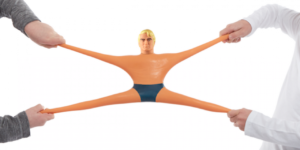 culture, the rest of the world operates on a more flexible time table. The word of the day is flexibility. A tall order for some, this is a chance to embrace the unexpected, learn a different flow and become more tolerant, agreeable, and open to change.
culture, the rest of the world operates on a more flexible time table. The word of the day is flexibility. A tall order for some, this is a chance to embrace the unexpected, learn a different flow and become more tolerant, agreeable, and open to change.
6. It will cost approximately the GNP of a small country to Fed Ex forgotten or emergency items to your student abroad, with no guarantee they will arrive. Double check the packing list. Pre-fill medications and have back-up credit cards. If they’re traveling across borders while abroad, be mindful of different regulations for what’s allowed in carry-on’s or backpacks.
7. Technology can be friend or foe. Shop around for international data plans, and be sure to get something so your student is reachable without WiFi in case of emergency. FaceTime or Skype is wonderful when you just need to put eyes on them. It might take the whole semester, but eventually they will remember that the time difference means that while they may be riding elephants in the Thailand afternoon, you are in a deep, sound sleep in the wee hours. Or at least you were.
8. You aren’t going to want to know everything before it happens. You should’ve already adjusted to this truth of college life, but sometimes it’s better not to know until afterwards. My friend’s daughter bungee jumped off a 440 foot platform in New Zealand while studying abroad, and to this day her mother cannot watch the video. It’s the age of Vimeo and GoPro, and your millennial is going to want some choice post-able footage of their time away. Squeeze your eyes shut, stick your fingers in your ears and loudly chant: LALALALALA.
9. They’ll learn a measure of independence. While you may be footing at least some of the bill, they’re having to manage logistics, relationships, and emotions from far away. They have likely done this already just in their regular university situation, but being thousands of miles overseas forces the issue somewhat. They learn to work it out, tough it out, or cry it out on their own. They realize they are capable.
10. The student you dropped off at the airport likely will not be the same one who greets you several months later. He will seem wholly different somehow in a way you cannot at first pinpoint. She will be morphed by confidence and distance, transformed by her experiences, more worldly and seasoned person. You will burst with pride at his accomplishments and feel his joy as he describes moments with breathless excitement. Except the part about paragliding over the Alps. Then you will clutch your chest and demand to know what she was thinking.
A final note: once they arrive safely at home, don’t forget to Tweet Liam Neeson and tell him you will no longer have him on speed dial.

by bsquared5@aol.com | Feb 14, 2017 | Thoughts
Bless me, Father, I still do valentines for my grown up kids. I’m five years past the classroom Valentine’s Box hoopla of hunting down a shoe box and trying to decorate it about half an hour before bedtime the night before. The grocery store Valentines that we argued over still had to be labeled for every kid in the class–(neatly, please! You can’t even tell whose name that is!)–with protests and whining about having to give one (yes, a NICE one) to all the girls. Doing this with my daughter was easier. A pink girly Valentine box with stickers and hearts was just fine, but is there such a thing as a masculine Valentine box? Something about lizards and Darth Vader just doesn’t say Valentine’s Day. But whatever.
Valentine boxes always caused issues. There were always the one or two kids who got all the lame valentines, the over-achieving parents who had to ALSO include candy (no nuts, gluten free) with each one, and the surprise and gossip caused by finding an extra special note from “Guess Who?” or “Secret Admirer.” Bless the teachers on Valentine’s Day, who try to judge the best box, organize 20+ hyper first graders to put the right valentines in the right boxes, and oversee the class party with spilled red juice and way too many pink cupcakes. They are headed straight to heaven.
Bless the parents of multiple grade schoolers who have to oversee and coordinate 40, 60, or 80 plus handwritten valentine notes and go through untold closets to find battered and torn shoe boxes. Bless those Mother Hubbard parents whose craft cabinets are bare of glitter, stickers and glue. Who are cleaning up said glitter and piles of sticky spilled Fun Dip and pixie sticks this very morning. And who will, by rights, pilfer their children’s valentine candy upon their arrival home from school. Did they learn nothing from Halloween? Thou shalt not trust parents with chocolate. I’m pretty sure that’s in the Bible somewhere. I’m paraphrasing.
This morning my 17-year-old came down ready for school and tucked into breakfast with approximately zero idea that the calendar had flipped to February 14. It’s actually kind of refreshing how un-phased he is by the date. In late December, the aisles of Christmas decorations have barely disappeared when suddenly everything turns to red and pink. Those chalky pastel candy hearts with the stamped messages show up: hot stuff, QT pie, be mine. He is happily oblivious and has been since middle school.
Not one valentine box has survived. I can’t even track down any of the valentines either of my kids have received over the years from “yore good freind Taylor.” Our shoe boxes inevitably got recycled into show & tell containers, book report dioramas, or a fancy house for the hapless frog that forgot to make itself scarce in the backyard.
So, although I do not miss the valentine box phase, I haven’t quite given up on the day altogether. This morning I snuck a bag of cherry blow pops into my high school junior’s lunchbox because it is open season for trying to bribe a hug from a bristly adolescent who now towers over me.
#shameless
http://gph.is/1NrlrlB
At least it wasn’t a love-struck Darth Vader holding a pastel heart stamped with “hubba hubba”. I do have standards.
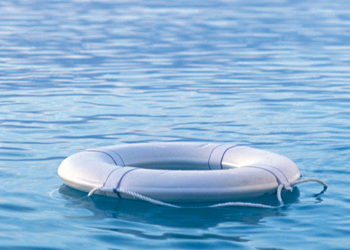
by bsquared5@aol.com | Feb 8, 2017 | Thoughts
My father’s brand of parenting was both efficient and effective. With five children, perhaps he lacked the time to coddle, or more likely, his military bearing precluded the impulse. I learned to ride a bike by careening downhill in the backyard, honing my steering by avoiding pine trees as they rushed by in a blur. He had imparted the facts at the top of the hill, pertinent information about pedaling, braking, and keeping your eyes up. Gravity and physics are master professors.
All three of my older sisters became ace softball players, singular in their ability to field, unafraid of pop-up ground balls. They’d lived through hours of practice in the hot Florida sun, my father beaming fast-pitch into their thin leather gloves until their palms stung. Loss of focus or flinching could mean a bobbled catch, a ball-sized bruise beneath their floral tank tops and directions to Walk It Off. It was softball as self defense.
My younger brother learned to swim before he turned two. A pool in our backyard and a toddler with stealthy escape skills drove my mother crazy with worry. So she sat chain smoking by the pool while my father hired an avant-garde teacher to toss her youngest into the deep end, his blue eyes wide under the water as he blew bubbles and paddled to safety.
We learned independence early. When it came time to pick a career path or a college, there were no fancy weekend tours, guidance counselor sessions, or laboring over applications and essays. The process was more of a self-directed cursory decision, driven by the calendar and necessity. No water wings, no kiddie pool–just sink or swim.
Faced with these polar options, we gained fortitude and an admirable proficiency at faking confidence even when–especially when–we felt it least. Once when one of my sisters was about 10, my father decided it was time for her to learn to water ski. We took the boat out on a less populated Florida lake and in she went, skinny arms held straight out in front of her and her knobby knees slightly bent atop skis that felt awkward and too large for her thin frame. With the motor idling, you could hear the deep croaking of the alligators on the bank calling to each other. Of course there were gators. Every body of water in Florida contains gators. You’ve never seen a faster study on water skis than my sister. She got up and stayed up, at least until he had to stop to refuel. As we slowed, she sank, her eyes growing wider as the dark lake water swallowed her whole. I have never doubted Jesus’ miracle of walking on water. I witnessed it first hand as my sister made it to the boat in record time.
We all learned to become high-achievers. When the alternative to failure is becoming reptilian lunch, the non-lunch option is popular. Some of us are just wired this way, call it Type A or chalk it up to perfectionism. The stakes stay high. It’s like living life in the middle of the James Bond car chase scene at all times–motivating, exciting, and intense, but exhausting. Every little letdown becomes a crisis with personal implications. Imagine: your car breaks down and heads will roll because someone somewhere should have seen this coming. Your toddler has a melt down and the entire grocery store must be judging your moral disgrace. You get a “B” in a class and all you see are the 10 ways you should have studied harder. In sink-or-swim living, there’s no room for error, no patience for sub-par.
Keeping the snarling dog of failure at bay means having to be constantly alert. Because life is black and white, options get reduced to an either/or: sink or swim. Stepping out with something new, a change in the landscape, sends primal signals to the survival center: fight or flight. Because the universe has a sense of humor, all the good things come with risk of failure and the most messiness–relationships, creativity, opportunity. When you’ve been conditioned to avoid failing, you do one of two things: (1) dodge the risk altogether and don’t try (stay safe), or (2) do try and stay in a perpetual state of freaking out when things go awry (stay in crisis). Both are unacceptable and frankly more than a little whack.
A provocative book called Nurture Shock discusses the outcomes of different ways to praise children. One group was told they were smart; the other, that they were hard workers. Hard work is something they could control; being smart is evidence of something out of their control. After being given increasingly difficult puzzles to solve, the “smart” group gave up earlier. They stopped trying. Failure to solve the puzzle would mean they were no longer smart. The “hard workers” never stopped trying. Failure didn’t diminish their identity; it was something they knew they could work through, and even learn from, given enough time.
It’s taken some reprogramming, but thankfully I’ve learned life rarely operates in black and white. In between sink or swim is a whole other option. Ironically, the infant swim teacher taught us this, too. We can float. Floating involves no freaking out, no shortness of breath or raging at onlookers. Turns out it’s mostly peaceful and we get a great view of the sky while we’re at it. Unless we’re fleeing the alligators, which, let’s be honest, are mostly creatures of our trumped up imaginations, floating allows us space to trust ourselves, the universe, and other people for help. The water itself–the very thing we were struggling against or afraid to jump into–becomes a source of buoyancy, bearing us along with the tide.
Struggle and failure hold gifts of wisdom and character that can be received no other way. When we give ourselves and our children the freedom to fail, we sprinkle grace into our lives. We learn to sit in the mess and take stock with reasonable objectivity, picking out the good parts and tossing aside the rest. Best of all, we learn to link hands with other failures–otherwise known as humanity–until forgiveness, humility, and grace become second nature. We lie back with arms outstretched, fill our lungs with a long, slow breath, and float.
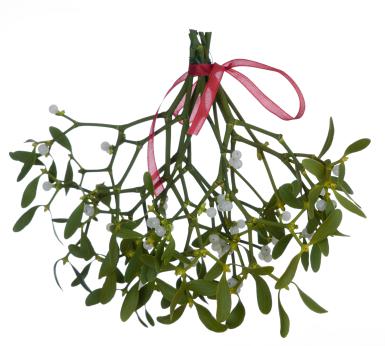
by bsquared5@aol.com | Dec 23, 2016 | Thoughts
After a brisk winter storm or two in my area of the country, when the last of the tenacious rust-brown oak leaves have finally stopped clinging to the branches, a hawk-eyed hunter can usually spot clumps of mistletoe hanging high at the tops of oak trees. I spied some myself this week, as I drove home lost in thought on a gray afternoon.
 The uninitiated might mistake the tangled clumps for dead branches or even a squirrel’s nest, but I knew better. When I was a teenager, our house sat on several wooded acres in middle Tennessee, God’s country. My parents sat on the back porch in the mornings drinking coffee and watching deer, turkey, and chipmunks shuffle through the leaves in the backyard. Somewhere towards mid-December every year, my brother or father would disappear into the woods with a shotgun in hand and return an hour or so later, pink-cheeked and smelling of the outdoors, to lay a tattered clump of mistletoe on the kitchen counter.
The uninitiated might mistake the tangled clumps for dead branches or even a squirrel’s nest, but I knew better. When I was a teenager, our house sat on several wooded acres in middle Tennessee, God’s country. My parents sat on the back porch in the mornings drinking coffee and watching deer, turkey, and chipmunks shuffle through the leaves in the backyard. Somewhere towards mid-December every year, my brother or father would disappear into the woods with a shotgun in hand and return an hour or so later, pink-cheeked and smelling of the outdoors, to lay a tattered clump of mistletoe on the kitchen counter.
The only way to acquire the kissing sprig, which is actually a parasite to its host tree, is to blast it from the treetops with a well-aimed shotgun. Not very romantic. What is romantic, though, is my father snapping off a twig or two and cornering my mother at the kitchen sink, her hands in the dishwater. He’d hold the lime-green leaves above her head and lean in for a kiss, usually getting a soapy swat for his trouble.
I love many things about the holidays, but mistletoe memories rank right up there. When my husband and I were dating, I could always count on him sending me a note at school with a tiny sprig enclosed or dipping a gloved hand into his coat pocket at an opportune moment to pull out a red-ribboned bunch.
When the kids were small, they would often sit purposefully underneath the door frame where the mistletoe hung, their not-so-subtle indication that it was high time for some snuggles. As they grew, it became a game to see who would get caught there and have to submit, squirming, as mom planted a kiss on a grossed-out teenager’s cheek. Through some phases of their lives, I was resigned to only getting affection under Christmas duress.
That’s the beauty of mistletoe. It’s power to compel a kiss is an inarguable given, like midnight on New Year’s Eve or spin-the-bottle in middle school. For the most part, unless you’re trying to escape the creeper at the annual office party or drunk Uncle Edgar (and in that case, there most definitely is the right of refusal), those innocent green branches and white berries add a little Hallmark magic to the stress of the holidays. Even in the midst of an argument or an overdone schedule, mistletoe is the trump card. A peace-offering. A reminder of the things that really matter.
Real mistletoe is harder to find these days. Maybe the countryside is receding or maybe it’s just easier for guys to click “add to cart” at Christmas instead of tramping through the cold woods in search of a bit of old-fashioned romance. Fewer people live out in the country anymore, where you know how to dig for ginseng and can identify the scrapes on tree bark as those left by the antlers of rutting deer. And apparently it’s not polite to blast shotguns towards the treetops in suburban neighborhoods.
I haven’t had any real mistletoe in the house in a few years. The fake, plastic kind just isn’t the same. Maybe that’s why I had to stop and take a picture of 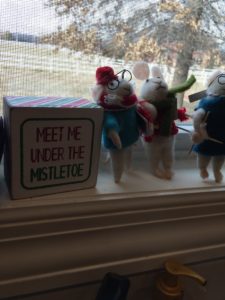 the far away clusters I spotted by the interstate this week. I needed a reminder of a time when life was simpler and nothing made me happier than watching my mom and dad dance to the Christy Minstrels album in the kitchen after a soapy kiss. Since the real thing is hard to come by, I have a little sign posted on my kitchen windowsill, right above the sink, where it’s obvious when I’m doing the dishes.
the far away clusters I spotted by the interstate this week. I needed a reminder of a time when life was simpler and nothing made me happier than watching my mom and dad dance to the Christy Minstrels album in the kitchen after a soapy kiss. Since the real thing is hard to come by, I have a little sign posted on my kitchen windowsill, right above the sink, where it’s obvious when I’m doing the dishes.
I conjure my own mistletoe, metaphorically. There’s no sly evasion of the door frames anymore. The teenagers receive begrudged smooches without warning, and when the husband comes in from the cold, smelling of the outdoors, it’s an opportunity to gross out the aforementioned teenagers even more. (wink, wink*)
May your days be merry and bright!
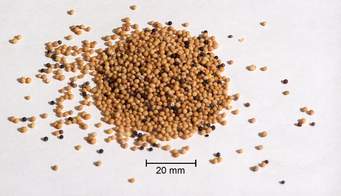
by bsquared5@aol.com | Nov 14, 2016 | Thoughts
Monumental events are making the news lately. We just finished the 2016 US election, a super moon hangs low on the night sky, the Cubs won, and Brad and Angie are officially kaput. At least one of these seems to have the country’s mood in its clutches, kind of like when dementors drift through the aisles of the Hogwarts Express.
It’s heavy. In a lot of homes, maybe yours, there’s a real possibility that it could hijack next week’s Thanksgiving as you sit gingerly next to people who see things differently, or who cast a different ballot. Like that 15 pound turkey Mamaw used to roast, it’s a lot to digest.
So I’ve been thinking small lately, and not just because of the news. Some days there’s just not enough coffee and I CAN. NOT. EVEN. Because I got home from the crowded grocery store and forgot a crucial item, a good friend just watched her mom go into assisted living, and my doll-sized mammogram cape kept flapping open all the way down the hall.
Overwhelmed is the word of the day. I can’t fix poverty and racism, make people love each other, or even remember to pray for everyone on the list. It becomes too easy to pull the covers up to my chin and surround myself with purring cats and Nutter Butters, or the rejects of the Halloween candy. Clearly, not a healthy alternative. Also, people have had Christmas lights up since October and we are hurtling towards the holidays–which are a big reason the word overwhelming was invented in the first place.
As I stood outside this afternoon trying to recover from the flapping cape incident, I noticed the chickadees throwing a party on the spent coneflowers. They were after the seeds. A neon arrow pointed down from the heavens, obnoxious enough that I recognized it in spite of myself. Seeds. Tiny, beautiful things. Birds, with their teeny bird beaks, have to eat them one at a time. They can’t mindlessly cram in handfuls like we do with potato chips or M&Ms.
Everything seemed to contract, reduced from the noise and angst of all the big Too Much of the world to a spiky black seed no bigger than a splinter. One tiny, beautiful thing.
These things will save all of us. One tiny irridescent raindrop at a time makes a downpour. Tiny seconds stretch into hours, days. Tiny grains of sand pile into miles of beach. One act. One prayer. One smile. One dollar. One seed at a time.
One of the smallest of all seeds is the mustard seed. You can hardly hold it in your hand without it falling through your fingers, but hallelujah that’s all that’s needed. Some days that’s all that’s left. A measure of faith that small can move mountains. We aren’t required to live every day in grand, sweeping gestures that remake the whole world. We aren’t asked to fix it all, do it all, be it all, know it all, or believe it all.
For now, we can all have one ounce of courage, show one person love, be grateful for one thing. Baby steps. Tiny, beautiful things.

 give in-depth and animated analysis of the part where the naive American girls give out personal information to a perfect stranger at the airport. Point out that while you don’t personally know Liam Neeson, you do have his speech memorized and are completely willing to make good on his threat. While it probably won’t, things can happen (Paris, Brussels, Nice), so make sure everyone has emergency numbers, passport copies in multiple locations, and international medical coverage.
give in-depth and animated analysis of the part where the naive American girls give out personal information to a perfect stranger at the airport. Point out that while you don’t personally know Liam Neeson, you do have his speech memorized and are completely willing to make good on his threat. While it probably won’t, things can happen (Paris, Brussels, Nice), so make sure everyone has emergency numbers, passport copies in multiple locations, and international medical coverage. culture, the rest of the world operates on a more flexible time table. The word of the day is flexibility. A tall order for some, this is a chance to embrace the unexpected, learn a different flow and become more tolerant, agreeable, and open to change.
culture, the rest of the world operates on a more flexible time table. The word of the day is flexibility. A tall order for some, this is a chance to embrace the unexpected, learn a different flow and become more tolerant, agreeable, and open to change.





